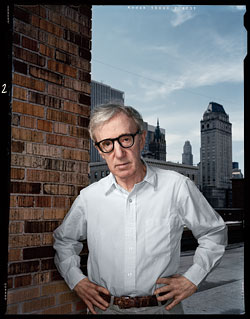 |
(Photo: Dan Winters) |
Few would argue that Woody Allen is the filmmaker most identified with New York, a distinction that has less to do with the settings of his movies (though most were shot here) than with a sensibility that is urban and anxious and obsessive, and often (still) very funny. Born in the Bronx in 1935, he grew up in Flatbush and had his first joke published in the New York Daily Mirror at age 16. His movie career almost exactly spans the 40 years of this magazine’s history—from Take the Money and Run, released in 1969, to Vicky Cristina Barcelona, his 39th movie, which came out this summer. When we met in early September, he was editing Whatever Works, a comedy starring Larry David that will be released next year—and that marks Allen’s return to New York after filming his last four movies abroad. (“I can only tell you it’s about a crabby character who lives in New York and has an experience with Evan Rachel Wood and Patricia Clarkson,” he says, “a comic experience I’m hoping is funny. But for me to say it’s funny doesn’t mean anything.”) We spoke in his screening room on Park Avenue, huddled close on two rolling chairs because, he said, he is hard of hearing. He was soft-spoken and voluble, his voice rising slightly only when the conversation ventured, in asides, into the present political climate, a state of affairs that clearly exasperates him. But mostly we talked about the city—both the one where he lives and the one in his imagination.
New York: Let’s start with the opening of Manhattan, as ecstatic a valentine to New York as any four minutes in the history of movies. Over a series of iconic images of the city, the voice-over begins, “Chapter One: He adored New York City, he idolized it all out of proportion—no, make that, he romanticized it all out of proportion.” How much of that is you speaking, and how much is your character, Isaac?
Woody Allen: Well, you know, for some reason I’ve always had an irrational love for New York. There’s no reason that you would necessarily like it on paper. It’s very expensive. Very little of it works. I’ve made films in many cities—London, Barcelona—where the people are very polite and courteous. You think to yourself, Oh God, this is a pleasure. And New York is nothing like that. But the city is so full of chaos, and the chaos is, for many people, pleasurable. Recently, I was living in a sublet on Madison Avenue, and every night you would hear ambulances and sirens. It was truly a lullaby. And I remember years ago once sleeping out in the Hamptons—
NY: You owned a house in Southampton …
WA: Yes, this is true. Many years ago, when everyone I know had houses in the Hamptons, I thought maybe it was for me too. I bought a very, very beautiful house in Southampton, and I spent over a year fixing it up. I put in trees, I changed the roof; I mean, I did an incredible job. Then I went out there one night and I slept in it, and I never came back.
NY: At the time you made Manhattan, the portrait of New York in the movies was pretty bleak. Films like Death Wish made it seem like a violent cesspool. Were you deliberately trying to replace that impression with a more romantic one?
WA: Well, I was raised on those movies that gave you an image of Manhattan, and that was the image of Manhattan that I fell in love with. I grew up in Brooklyn, and I wasn’t privy to the parties and the people at the Stork Club with their ermines over their shoulders coming in at four in the morning and calling people on white telephones next to the bed. Where I lived, we ate on linoleum. So when I moved to Manhattan, I wanted the actual Manhattan to be like that. I wanted people to be able to go to the theater at 8:40 and then to a supper club, and to be able to walk home through Central Park. I didn’t want them to have to fear for their lives. So I pushed my idea of it, and people always used to say to me, “Oh, you look at New York through rose-colored glasses.” And that’s fine, but I got my idea of New York from Hollywood.
NY: But if you were making a movie about your real New York, what would that movie look like? How different would it be?
WA: Well, because I’ve been successful, I’ve made enough money so that I can live fairly decently in New York—first in a very pretty penthouse on Fifth Avenue, and now in a very pretty townhouse in the Seventies, between Park and Lex. I have a driver. I eat at the good restaurants. I live, in a certain sense, in a bit of a bubble in New York. I don’t live exactly realistically.

